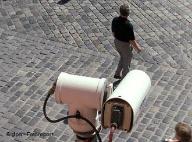Germany to Allow Video Surveillance of Private Homes
DW-World.de
April 18, 2008

Not even the home will be safe from surveillance
Changes proposed to the law governing Germany's federal criminal police operations would allow investigators to use wire taps and surveillance cameras in homes of innocent citizens to keep tabs on terror suspects.
Under the government proposals, federal police would be permitted to install "hidden technical equipment, that is to say bugs or cameras inside or outside apartments ... if there is a pressing danger for state security," interior ministry spokesman Stefan Paris said at a news conference on Friday, April 18.
"I would urgently like to stress that there are very, very strict conditions ... and it is not the case that everywhere in this country secret cameras or listening devices will be installed in living spaces," he said. "It is about terrorist threats that would be averted through preventative measures by the federal police."

Be careful what you -- and your friends -- say at home
He added that such methods were already allowed in several German states.
"Recording and filming must be restricted to the suspect and the suspect's own home These methods are also permissible in the homes of other persons if evidence shows that the suspect is present or if employing these measures solely in the home of the suspect is insufficient to contain potential risk. The measure may also be taken if other persons are immediately at risk," says paragraph 20 of the draft, according to the dpa news agency.
In the past, such measures were illegal on the grounds that they marked a breach of the sanctities of the home and the confidentiality of private conversations. Current regulations call for police to turn off their equipment when suspect talk about private matters.
A cabinet decision on what is known as the BKA law is expected this summer. The acceptability of using video cameras as well as microphones in private homes for up to a month has divided opinion among the Social Democrats, who share power at the federal level with Chancellor Angela Mekel's Christian Democrats.
Skepticism persists

Cabinet ministers recently agreed spy software could be used in Germany
The new draft regarding video surveillance met with resistance among members of her party. Berlin's Interior Minister Ehrhart Koerting (SPD) and Sebastian Edathy (SPD), the chairman of the Bundestag's Interior Affairs Committee, were among those voicing strong skepticism.
"I see no need for video surveillance in private homes," said Edathy in the daily Neue Osnabrücker Zeitung on Friday. "There is no apparent justification."
He also stressed that his party would resist this most recent extension to BKA privileges.
After months of discussions, Justice Minister Brigitte Zypries (SPD) and Interior Minister Wolfgang Schaeuble (CDU) settled this week on a compromised version of the BKA Law, with Zypries drawing the line at allowing investigators to break into homes to install spyware programs on private computers.
As it stands, investigators may only access private computers via the Internet.
Resistance remains
The SPD's interior affairs expert Dieter Wiefelspuetz had similar reservations about the online searches.
"This needs to be looked into carefully," he said, also expressing the hope that the Christian Democrats' push to allow police to break into private homes would be unsuccessful.
"If they try to get this through, they will soon end up in the country's Constitutional Court," he predicted. "Covertly entering people's homes to install spying software would only be acceptable if the Constitution is changed," he stressed.
Interior ministers' conference

Schaeuble's proposals have been described as draconian
Germany's state interior ministers are ending their spring conference in the spa resort of Bad Saarow in Brandenburg on Friday.
Topping the agenda were the issues of online searches and a possible ban on the far-right party, the NPD.
In Friday's edition of the daily Schweriner Volkszeitung, Edathy criticized the participants' failure to make progress on the latter issue:
"The majority of the CDU and the CSU are unwilling to discuss creating a framework that would allow an NPD ban," he complained.